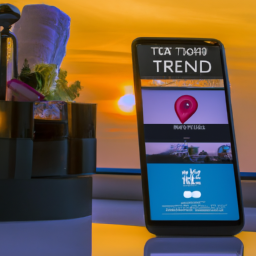Events Industry Trends
In the fast-paced world of event planning, it’s crucial to stay ahead of the latest trends that shape the industry. From emerging technologies to changing consumer demands, understanding the current landscape is essential for success. In this article, you will explore the exciting developments and shifts in the events industry. Discover how technological advancements, evolving attendee preferences, and sustainability initiatives are influencing the way events are organized and experienced. Stay tuned to gain valuable insights into the future of event planning and management.

Table of Contents
Technology
Virtual and hybrid events
Virtual and hybrid events have become increasingly popular in recent years, especially in the wake of the COVID-19 pandemic. As technology continues to advance, more and more event organizers are embracing the benefits of hosting virtual or hybrid events. Virtual events allow attendees to participate from anywhere in the world, eliminating the need for travel and reducing costs associated with venue rentals. Hybrid events, on the other hand, provide a combination of in-person and virtual experiences, allowing both physical and remote attendees to engage with the event content. These types of events offer convenience, flexibility, and the opportunity to reach a larger audience.
Event management software
Event management software has revolutionized the way events are planned, organized, and executed. This software provides a centralized platform for event organizers to manage various aspects of the event, including registration, ticketing, attendee management, agenda planning, and communication. With event management software, organizers can streamline their workflows, automate repetitive tasks, and gain valuable insights into attendee data. This technology not only saves time and effort but also enhances the overall event experience for both organizers and attendees.
Contactless check-in and registration
In an era of social distancing and heightened health and safety concerns, contactless check-in and registration have become essential for events. Instead of traditional paper-based methods, organizers are increasingly adopting technology-driven solutions such as QR code scanning or mobile apps for digital check-ins. This not only reduces physical contact and eliminates long queues but also provides a more efficient and seamless experience for attendees. Contactless check-in and registration also allow organizers to collect valuable data on attendee preferences and demographics, enabling them to personalize the event experience further.
Live streaming and on-demand content
Live streaming and on-demand content have transformed the way events are consumed and shared. With live streaming, event organizers can broadcast their events in real-time, allowing remote attendees to participate virtually. This technology provides an interactive and immersive experience, enabling remote attendees to engage with speakers, ask questions, and network with other participants. On-demand content, on the other hand, allows attendees to access event recordings, presentations, and other resources at their convenience. This flexibility ensures that attendees can consume event content even after the event is over, maximizing the value they derive from attending the event.
Virtual reality and augmented reality
Virtual reality (VR) and augmented reality (AR) have emerged as powerful tools for enhancing the event experience and creating immersive environments. VR technology allows attendees to enter a virtual world where they can interact with 3D models, simulate real-world scenarios, and experience events in an entirely new way. AR, on the other hand, overlays digital content on the real world, providing attendees with additional information, interactive elements, and personalized experiences. These technologies not only add excitement and novelty to events but also allow organizers to showcase products, educate attendees, and create unforgettable experiences.
Sustainability
Environmentally friendly event practices
In recent years, there has been a growing emphasis on sustainability in the events industry. Event organizers are increasingly adopting environmentally friendly practices to minimize their impact on the planet. This includes implementing recycling and waste management programs, using renewable energy sources, and reducing water consumption. Organizers are also exploring innovative solutions such as eco-friendly event materials, biodegradable packaging, and sustainable transportation options. By adopting these practices, events can reduce their carbon footprint and contribute to a more sustainable future.
Reducing waste and carbon footprint
One of the key sustainability challenges in the events industry is the generation of waste, particularly from single-use items such as badges, lanyards, and promotional materials. To address this issue, event organizers are adopting practices such as digital ticketing, electronic signage, and reusable materials. By reducing the amount of waste generated, events can significantly reduce their carbon footprint and contribute to a more sustainable environment. Additionally, organizers are encouraging attendees to adopt sustainable practices, such as bringing their reusable water bottles or opting for vegetarian or plant-based food options.
Green event venues
Choosing green event venues is another way to promote sustainability in the events industry. Green venues prioritize sustainable practices, such as energy-efficient lighting and heating systems, water conservation measures, and waste management programs. These venues may also have certifications or accreditations that demonstrate their commitment to sustainability, such as LEED (Leadership in Energy and Environmental Design) certification. By selecting green event venues, organizers can minimize the environmental impact of their events and provide attendees with a more sustainable experience.
Sustainable event materials
Event materials, such as signage, banners, and promotional items, can contribute significantly to waste generation. To address this issue, event organizers are opting for sustainable materials, such as recycled paper, bamboo, or biodegradable alternatives. These materials not only reduce waste but also showcase the organizer’s commitment to sustainability. Additionally, organizers are exploring digital alternatives, such as digital signage or mobile apps, to minimize the use of physical materials. By choosing sustainable event materials, organizers can set an example for attendees and promote sustainable practices.
Eco-conscious food and beverage options
Food and beverage choices at events can have a significant impact on sustainability. Organizers are increasingly opting for eco-conscious options, such as locally sourced, organic, or seasonal ingredients. These choices not only support local farmers and reduce transportation emissions but also promote healthier and more sustainable food practices. Additionally, organizers are minimizing food waste by implementing strategies such as accurate meal planning, donation of surplus food, or composting. By offering eco-conscious food and beverage options, events can align with attendees’ values and contribute to a more sustainable food system.
Personalization
Tailored attendee experiences
Personalization has become a key trend in the events industry, as attendees increasingly expect tailored experiences that meet their individual preferences and needs. Event organizers are leveraging technology to gather data on attendees, such as their interests, demographics, and past engagement with the event or organization. This data allows organizers to personalize various aspects of the event, such as the agenda, content sessions, networking opportunities, and even promotional materials. By offering personalized experiences, organizers can enhance attendee satisfaction, engagement, and loyalty.
Customized event content
Customized event content is another way to provide personalized experiences for attendees. Instead of offering a one-size-fits-all approach, event organizers are tailoring their content to meet the specific interests or professional needs of different attendee segments. This may include offering different tracks or sessions targeting specific industries, skill levels, or job roles. By providing customized content, organizers can ensure that attendees receive relevant and valuable information, boosting their overall event experience and knowledge acquisition.
Segmentation and targeted marketing
Segmentation and targeted marketing are crucial for reaching the right audience and maximizing the impact of event promotions. Event organizers are using data analytics and attendee profiling to segment their audience into specific groups based on factors such as industry, job role, geographic location, or preferences. This segmentation allows organizers to craft targeted marketing messages that resonate with each segment, increasing the likelihood of attracting the right attendees. By using segmentation and targeted marketing, organizers can optimize their marketing efforts, increase event registrations, and enhance attendee satisfaction.
Personalized event technologies
Advancements in technology have enabled event organizers to offer personalized event technologies that enhance the attendee experience. For example, mobile apps can provide personalized agendas, session recommendations, and real-time updates tailored to each attendee’s preferences. Wearable technology, such as smart badges or wristbands, can enable personalized networking or gamification experiences. By integrating these personalized event technologies, organizers can create memorable experiences that cater to each attendee’s preferences and needs.
Individualized networking opportunities
Networking is a critical aspect of events, as it allows attendees to connect with peers, industry experts, and potential business partners. Event organizers are embracing technology to offer individualized networking opportunities that facilitate meaningful connections. This may include matchmaking algorithms that suggest relevant contacts based on attendee profiles, gamified networking activities that encourage interaction, or dedicated networking spaces designed to foster conversations. By providing individualized networking opportunities, organizers can enhance attendee satisfaction, facilitate knowledge sharing, and foster lasting professional relationships.






